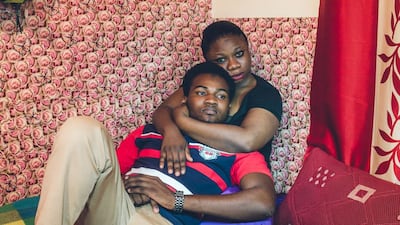NEW DELHI // Mahesh Shantaram had been disturbed by reports of racism and violence against Africans in India for years, but it was an incident in Bengaluru in February that got him to act.
A mob enraged by the death of a woman accidentally run over by a Sudanese student then attacked four Tanzanians who happened to be passing through the area in a car. The Sudanese student had escaped, but the crowd chased down one of the four Tanzanians, a woman, stripped her and set their car on fire.
“That was the trigger,” said Mr Shantaram, a freelance photographer. “This was in my city, and I didn’t even have any clue that there were all these Africans living in this area. I realised they were experiencing a sort of everyday racism, which was shocking to me.”
He began taking portraits of Africans living in India and writing down their experiences of racism. So far, he has photographed 17 subjects in the cities of Bengaluru, Delhi, Manipal and Jaipur, and hopes to continue shooting at least until the end of the year.
Mr Shantaram hopes to publish these portraits as a series in various media, and possibly hold an exhibition of them.
“What I want to do is to get India and Indians to take ownership of this racism problem,” he said. The photographs of people who experience this racism, he hopes, “will make viewers stop and look and want to know more”.
Bias against dark-skinned people is endemic in India, and African visitors bear the brunt of this prejudice.
In September 2014, a crowd in a New Delhi metro station attacked three African men accused of harassing a woman. A video of the incident that went viral shows policemen watching without intervening. The previous year, a Nigerian man named Obada Simeon was murdered in Goa, while in Bengaluru, an Ivorian engineer named Wandoh Timothy was beaten by a drunk man and his friends who called him racist names.
Most recently, on May 20, a student from the Democratic Republic of Congo named Masunda Kitada Olivier was attacked and killed in New Delhi I in an argument with three men over who had hired an autorickshaw.
The incident sparked protests by African students and diplomats. “Given the pervading climate of fear and insecurity ... the African Heads of Mission are left with little option than to consider recommending to their governments not to send new students to India,” a joint statement from the African diplomatic community said.
In response, government officials met African student groups in Delhi on May 31 to address their concerns. Last Wednesday, Sushma Swaraj, India’s foreign minister, asked the chief ministers of six states to speed up prosecutions involving violence against Africans.
Her letter had particular urgency given that president Pranab Mukherjee begins a six-day tour of Ghana, Cote d’Ivoire and Namibia on Sunday, while prime minister Narendra Modi plans to visit Mozambique, Kenya and South Africa next month.
But even aside from outright violence, Africans face prejudice daily, Mr Shantaram said.
Many of his subjects came to India for higher studies. “They have a natural affinity to India. They grew up on Bollywood movies, and they looked upon India as a desirable destination for education,” he said.
Typically, he said, these students live on the outskirts of cities, where rents are cheaper but the transport system is not very good. “These places were all villages until not very long ago, so certain frictions arise.”
African tenants are looked upon with suspicion, and often accused of being drug dealers, prostitutes or cheats. They have difficulties in finding accommodation. “They’re always living under some kind of insecurity or the other,” he said.
Joseph, a Kenyan university student in New Delhi who asked only to be known by his first name, said he was often turned down by landlords and cab drivers, without explanation. “If I’m walking back home late at night, police constables will stop me and ask me a million questions,” he said.
“I always get the feeling that I’m unwanted, or distrusted.”
Mr Shantaram’s subjects recounted similar experiences.
“People are so ignorant,” Hassan, a Zambian student of marketing in Bengaluru, told him. “They ask us if we wear clothes in Africa.”
Abdul-Kareem, a Nigerian student in Amer, on the outskirts of Jaipur, regretted that it was impossible to make friends with his Indian colleagues.
“If you speak to a thousand people from African nations in India, you’ll hear variations on the same 10 or 15 stories again and again,” Mr Shantaram said. “It’s a really difficult life they lead here.”
As a result, they have “a very complicated relationship with India”, he said.
“They love India, but they wonder why India hates them.”
ssubramanian@thenational.ae

